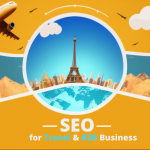Search Engine Optimization (SEO) is an important part of digital marketing for any business, but it can be especially important for travel and B2B companies and we as a SEO agency “APUS” are well aware of this and are ready to help you with this. Optimizing your website for search engines can help travel companies attract more leads and increase bookings, while SEO strategies can be used by B2B companies to stand out from the competition and attract more qualified customers. In this article, we will discuss the importance of SEO for travel and B2B companies, giving tips on keyword research, page optimization, link building, local SEO and tracking results.
Below are some of the key points that our team of professionals most often look at to promote travel and B2B business:

- Keyword Research
- On-Page Optimization
- Link Building
- Local SEO
- Tracking and Measuring Results
Keyword Research
An effective SEO strategy begins with keyword research. When it comes to keyword research for travel and B2B companies, the goal is to identify keywords that are relevant to your business, have a decent monthly search volume and are not too competitive. To find such keywords, start by brainstorming a list of terms related to your services. Then use keyword research tools like Google Keyword Planner or SEMrush to find keywords with the best search volume and competition. It’s also important to include location-based keywords in your research, as this will help you attract local customers or potential customers. Also, factors such as:
- Content marketing is a powerful tool to engage and captivate your target audience. It helps you reach potential customers with meaningful, helpful information that can be easily found online without compromising the quality of what’s being shared.
- Social media is an invaluable tool for businesses looking to up their game. With carefully crafted content, they can reach massive audiences and build a lasting reputation as industry leaders in the process!
Boost your website’s reach and draw in more visitors by leveraging the power of paid promotion. Utilize Google Ads or Facebook Ads to distribute targeted campaigns that will drive new audiences right to you!
On-Page Optimization
Once you’ve compiled a list of relevant keywords, it’s time to optimize your site for those terms. This means optimizing all of the page elements on your site, such as content, meta tags, title tags, and header tags. You should also include images and videos that match your keywords. All of these elements should be optimized to help search engines understand what your site is about and increase its ranking in search results. Also, our experts from “APUS” recommend paying attention to points such as:
- URL optimization – Make your website stand out from the competition by crafting neat, keyword-rich URLs that attract attention and engage viewers. Optimize for success with URL optimization!
- Internal linking – Making your website navigable and user-friendly is essential for both visitors and search engines. By utilizing internal linking, you can create a logical web of connections between pages to help make it easier for people to get around – which could have huge benefits in terms of SEO!
- Mobile optimization – Having your website optimized for mobile devices is essential in today’s digital world. Make sure you have a responsive design so that users will be able to access and navigate it seamlessly, regardless of their device or platform.
- Page loading speed -Make sure your website keeps up with the fast-paced online world. A quick page load time not only enhances user experience, but also can give you an extra push in search engine rankings for even greater visibility!
- Schema markup – Using schema markup capabilities, site owners can gain additional visibility and context for their content in search engine results. Structured data helps clarify what’s on each page and increases its relevance to users’ search queries, resulting in more organic traffic.
Typically B2B businesses use the “LocalBusiness” or “TravelAgency” scheme, you can see what they look like from the inside below:
Local Business schema in html:

TravelAgency schema in html:

High quality link Building
Link building is an important part of SEO because it helps search engines understand the relevance and authority of your site, and we at “APUS” make great use of this to promote our projects. To start building links for your travel or B2B business, focus on getting high-quality backlinks from relevant sites. These can be sites in the same industry, as well as travel and B2B directories. You can also reach out to influencers and bloggers in the industry to write a guest post or do an interview. What to keep in mind:
- Outreach – To open the door to more opportunities, successful outreach techniques are vital. Reach out and connect with influential sites within your industry via email, social media platforms or by building personal relationships – these steps can help raise interest in linking back to you.
- Broken link building – This is a strategy where you identify broken links on other websites and then reach out to the website owner to offer your content as a replacement.
- Content marketing – Discovering and exploiting broken links can be a powerful tactic for building link authority. By pinpointing websites with non-functioning content, website owners have the opportunity to reach out offering fresh new material as an effective substitute – making it beneficial for both parties!
- Local citations – Want your business to be seen in local searches? Make sure you’ve secured those valuable “local citations,” or mentions of your name, address and phone number on other websites. These are a key component for boosting search visibility in your vicinity!
- Social media – Share the news about your website on social media and develop relationships with your followers. Doing so will expand visibility, spread awareness of what you have to offer, and bring more traffic to your page!
Local SEO for Travel and B2B Business
If your travel or B2B business serves a local audience, it’s important to optimize for local SEO as well. This means optimizing your website with location-based keywords, claiming and verifying your Google My Business (GMB) listing, and asking customers for reviews. You should also make sure that all of your business information, such as the address and phone number, is consistent across all online listings. Pay attention to the key points:

- Creating and optimizing local business listings on directories such as Yelp, TripAdvisor, and YellowPages.
- Building and acquiring local backlinks from reputable local websites and directories.
- Creating localized content on your website and blog, to target specific local keywords and search queries.
- Encouraging and responding to customer reviews on local directories and review sites.
- Optimizing your Google My Business (GMB) listing with relevant information, photos, and categories.
- Creating location-specific landing pages on your website to help search engines understand your business’s location and services.
Tracking and Measuring Results
- Set up and monitor measurable goals, such as an increase in website traffic, leads or sales.
- Make sure you’re on top of your website’s success by utilizing tools like Google Search Console to track how visible and well-ranked it is in the search engine world!
- Track the progress of your target keywords and their rankings over time.
- Keep an eye on the actions of your website’s visitors to get a better understanding of what content they’re enjoying and how you can optimize their experience. Analyze which pages they visit, how long they stay while there, and other aspects in order to determine where improvements need to be made.
- Spice up your website by running A/B tests to discover the Promised Land of SEO! Analyze different elements, like headlines and images, to see which ones will help push you ahead in search engine rankings.
- Keep a keen eye out on the competition – compare your digital presence, visibility and ranking to their own to make sure you remain competitive.
Driving website traffic and optimizing digital presence is key for a successful travel or B2B business, making search engine optimization integral. With powerful keyword research, on-page tactics, link building efforts, and local SEO enhancements you can rise to the top of SERPs to reach more potential leads. Plus by tracking results you’ll get insights into what’s working – so your optimization stays ahead of the game!
How to take your B2B travel business to the next level with APUS SEO agency
Let “APUS” take your B2B travel business to the next level with our SEO services! Our experienced team provides comprehensive support, from researching effective keywords and optimizing pages for top performance, to creating engaging content and building powerful links.





